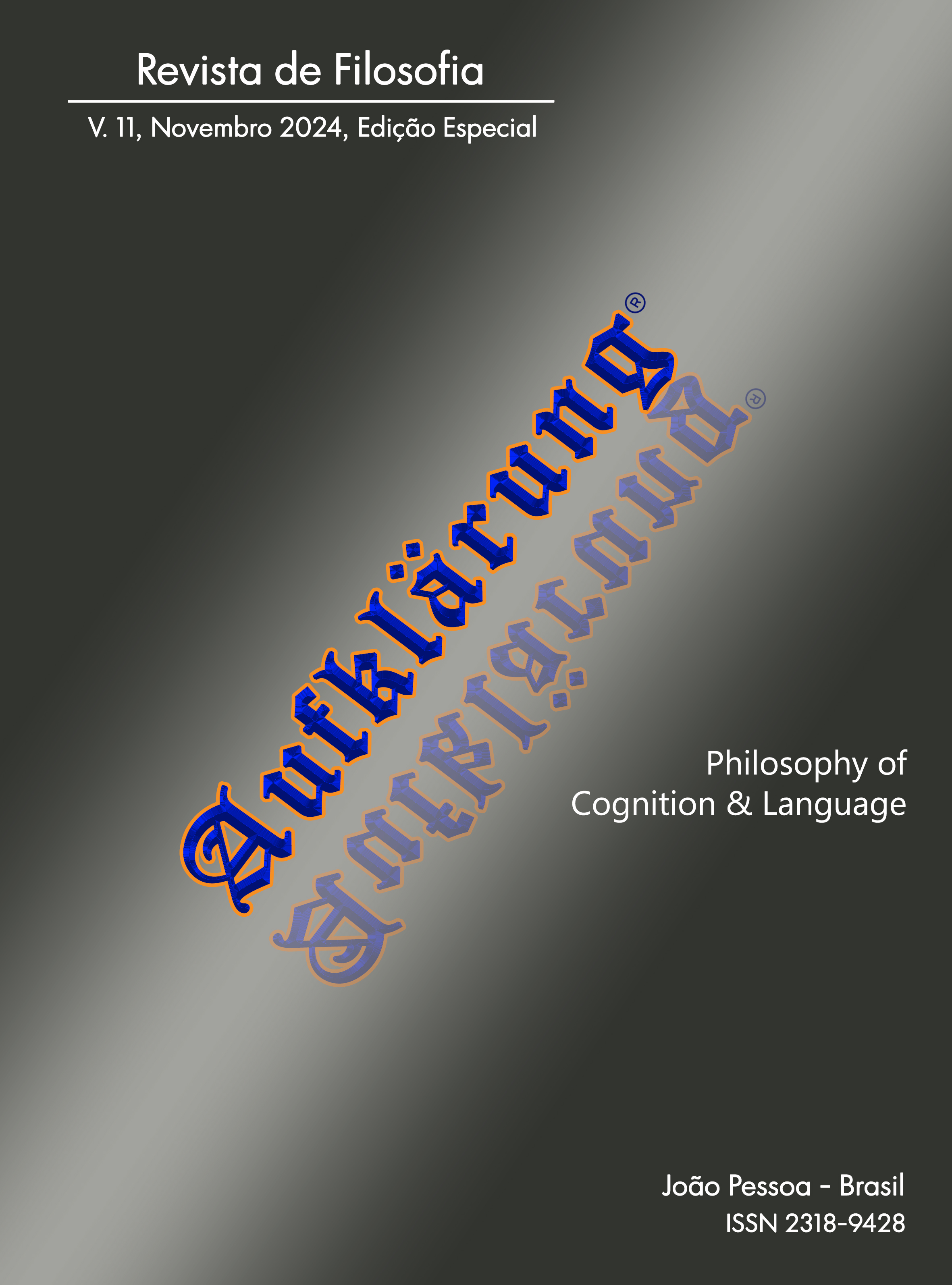Descriptive names and singular thoughts
DOI:
https://doi.org/10.18012/arf.v11iEspecial.69966Keywords:
Singular thought, Mental files, Acquaintance, Cognition, Identification and trackingAbstract
The aim of this text is to discuss a tension in the philosophy of language involving descriptive names. Descriptive names are those introduced or fixed in language through a definite description. The debate centers on whether the introduction of a name into discourse generates a new singular thought, i.e., a direct thought about an object that is not mediated by a definite description. Gareth Evans (1982) argues that descriptive names are incapable of producing singular thoughts, whereas David Kaplan (1989) contends that names introduced through a description do generate new singular thoughts. We will present two proposed solutions to this tension, those of Marga Reimer and Recanati. Both are considered attempts to reconcile the views of Evans and Kaplan. However, I will argue that these solutions are not truly reconciliatory. Lastly, I introduce a notion of singular thought inspired by Robin Jeshion (2010) and Imogen Dickie (2020), which establishes the focus of attention as the foundation for the formation of singular thoughts and explains how descriptive names can generate direct thoughts.
Downloads
References
ALMOG, J.; WETTSTEIN, H.; PERRY, J. (Ed.) Themes from Kaplan. New York; Oxford: Oxford University Press, 1989.
DICKIE, I. We are acquainted with ordinary things. In: JESHION, R. (Ed.) New essays on singular thought. Oxford: Oxford University Press, 2010. p. 213-245.
DICKIE, I. Fixing reference. Oxford: Oxford University Press, 2015.
DICKIE, I. Cognitive focus. In: GOODMAN, R.; GENONE, J.; KROLL, N. (Ed.) Singular thought and mental files. Oxford: Oxford University Press, 2020. p. 223-250.
DONNELLAN, K. Reference and definite descriptions. Philosophical Review, v. 75, p. 281-330, 1968.
EVANS, G. The varieties of reference. Oxford: Clarendon Press, 1982.
GOODMAN, R. Goodman, R. . On the supposed connection between proper names and singular thoughts. Synthese, v. 195, p. 197-223, 2016.
GOODMAN, R.; GENONE, J.; KROLL, N. (Ed.) Singular thought and mental files. Oxford: Oxford University Press, 2020.
GOODMAN, R. Mental Filing. Noûs, v p. 204-226, 2022.
HURRY, D. A. Vindicating Evans: a defense of Evans' theory of singular thought. 2021.
Tese (Doutorado em Filosofia) – University of Western Ontario, Ontario, Canadá.
Disponível em: <https://ir.lib.uwo.ca/etd/7655>.
JESHION, R. (Ed.) New essays on singular thought. Oxford: Oxford University Press, 2010.
JESHION, R. Singular thought: acquaintance, semantic instrumentalism, and cognitivism. In: JESHION, R. (Ed.) New essays on singular thought. Oxford: Oxford University Press, 2010. p. 105-141.
KAPLAN, D. Demonstratives: an essay on the semantics, logic, metaphysics, and epistemology of demonstratives and other indexicals. In: ALMOG, J.; WETTSTEIN, H.; PERRY, J. (Ed.) Themes from Kaplan. New York: Oxford University Press, 1989a. p. 481-564.
KAPLAN, D. Afterthoughts. In: ALMOG, J.; WETTSTEIN, H.; PERRY, J. (Ed.) Themes from Kaplan. New York: Oxford University Press, 1989b. p. 565-614.
KRIPKE, Naming and necessity. Cambridge, MA: Harvard University Press, 1980.
RECANATI, F. Mental files. Oxford: Oxford University Press, 2012.
RECANATI, F. Coreference de jure. In GOODMAN, R.; GENONE, J.; KROLL, N. (Ed.) Singular thought and mental files. Oxford: Oxford University Press, 2020. p. 161-186.
REIMER, M. Descriptive names and singular thought. In: GOODMAN, R.; GENONE, J.; KROLL, N. (Ed.) Singular thought and mental files. Oxford: Oxford University Press, 2020. p. 38-51.
Additional Files
Published
How to Cite
Issue
Section
License

This work is licensed under a Creative Commons Attribution 4.0 International License.
Journal general policy
1.This journal works under a Creative Commons License aplied to online journals. That icence can be read in the following link: Creative Commons Attribution 4.0 International (CC BY 4.0).
2.Accordingly to this License, a)the journal declares that authors hold the copyright of their articles without restrictions, and they can archieve them as post-print elsewhere. b)the journal allow the author(s) to retain publishing rights without restrictions.
Metadata Policy for information describing items in the repository
1. Anyone may access the metadata free of charge at anytime.
2.The metadata may be re-used in any medium without prior permission, even commercial purposes provided the OAI Identifier or a link to the original metadata record are given, under the terms of a CC BY license refered for the Journal.







































